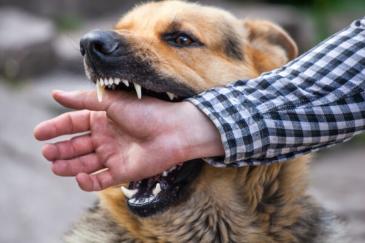Dog bites can be terrifying and traumatic experiences that have the potential to cause serious injuries and complications. Whether it’s a stray dog or a pet from a friend or family member, any dog has the potential to bite under certain circumstances. While it’s essential to take immediate action to address the wound, many individuals underestimate the importance of seeking medical attention after a dog bite incident. In this article, we will delve into the reasons why seeking prompt medical care is crucial following a dog bite, as well as the potential consequences of neglecting to do so.
Immediate Treatment for the Wound:
 Dog bites can result in puncture wounds, lacerations, and deep tissue injuries. These wounds can become infected rapidly due to the bacteria present in a dog’s mouth. Seeking medical attention promptly allows for the wound to be properly cleaned, disinfected, and treated with the appropriate medications. This reduces the risk of infection and ensures proper wound healing.
Dog bites can result in puncture wounds, lacerations, and deep tissue injuries. These wounds can become infected rapidly due to the bacteria present in a dog’s mouth. Seeking medical attention promptly allows for the wound to be properly cleaned, disinfected, and treated with the appropriate medications. This reduces the risk of infection and ensures proper wound healing.
Prevention of Infections:
As mentioned earlier, dog bites can introduce harmful bacteria into the body, leading to infections. Infections like cellulitis and rabies can be life-threatening if left untreated. A healthcare professional can assess the severity of the wound and prescribe antibiotics or other medications to prevent infections from taking hold.
Evaluation of Potential Rabies Exposure:
Rabies is a viral disease that can be transmitted through the saliva of infected animals, including dogs. It is crucial to determine whether the dog involved in the bite incident has rabies or is up to date on its vaccinations. A medical professional can assess the risk of rabies exposure and recommend appropriate post-exposure prophylaxis if necessary.
Identification of Tendon or Nerve Damage:
Dog bites can cause injuries deep beneath the skin’s surface, affecting tendons, muscles, and nerves. These injuries may not be immediately apparent, but a medical examination can reveal any underlying damage. Identifying and treating such injuries early on can significantly improve the chances of a full recovery.
Documentation for Legal Purposes:
In the event of a severe dog bite incident, seeking medical attention creates an official record of the injury and its treatment. This documentation can be crucial if legal action becomes necessary, whether to seek compensation for medical expenses or to establish liability for the incident.
Psychological Support:
A dog bite can be a traumatic event, leaving emotional scars in addition to physical ones. Seeking medical attention allows for emotional support and counseling to help the victim cope with the psychological aftermath of the incident.
Compliance with Local Laws and Regulations:
In some jurisdictions, seeking medical attention after a dog bite may be mandatory. Failing to do so could result in legal consequences or penalties. It’s essential to be aware of the specific laws and regulations in your area to ensure compliance.
Early Detection of Tetanus Risk:
Dog bites can introduce tetanus bacteria into the body, especially if the victim hasn’t received a tetanus vaccination within the last ten years. A medical professional can assess the risk of tetanus infection and provide the necessary vaccination or treatment.
Preventing Long-Term Complications:
Without proper medical attention, a seemingly minor dog bite can lead to complications such as chronic pain, scarring, and decreased mobility. Seeking medical care ensures that the wound is appropriately treated, minimizing the risk of long-term consequences.
Report the Incident:
After seeking medical attention, it’s essential to report the dog bite incident to the local animal control authorities or law enforcement. Reporting the incident helps create a record of the dog’s behavior and can prevent future attacks by the same animal.
Gather Information:
If possible, collect information about the dog and its owner, such as their names, contact information, and address. Additionally, if there were any witnesses to the incident, try to obtain their contact details as well. This information may be crucial for legal purposes or if you need to file an insurance claim.
Monitor the Wound:
Even after receiving medical treatment, it’s vital to keep a close eye on the wound for any signs of infection or other complications. If you notice any redness, swelling, increased pain, or drainage from the wound, seek medical attention promptly as these could be signs of an infection.
Follow Medical Advice:
Listen to the advice and instructions provided by the healthcare professional who treated your dog bite wound. This may include taking prescribed medications, changing dressings, and attending follow-up appointments. Following medical advice diligently will help ensure a smooth recovery.
Seeking immediate medical attention after a dog bite incident is of paramount importance. It ensures that the wound receives proper care, reduces the risk of infections, and facilitates early detection of any underlying injuries or potential risks.
If you or a loved one has experienced a dog bite incident, do not hesitate to seek medical attention right away. Remember that neglecting to do so can lead to severe consequences for your health and well-being. At Wyant Law, we understand the importance of protecting your rights and helping you navigate any legal matters that may arise from a dog bite incident. Our experienced team is here to provide guidance and support during this challenging time.

